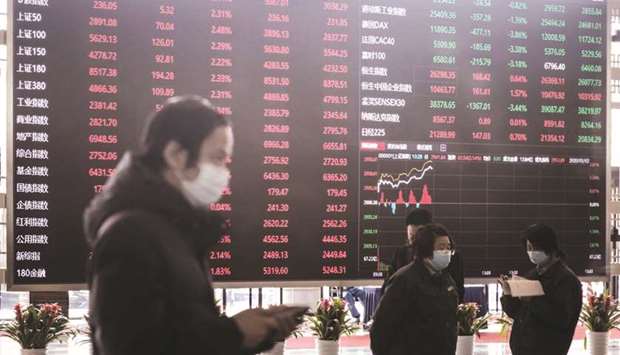Asian markets sank yesterday as rising virus infection rates across the world put the brakes on the latest rally.
Equities have shown a healthy resilience to the rapid spread of the disease around the world, with hopes for the economic recovery, the easing of lockdowns and government largesse providing crucial support.
But several days of figures showing a record number of new cases in populous US states including Florida, Texas and California — leading to the reimposition of containment measures — were beginning to sink in.
A lockdown in Australia’s second-biggest city Melbourne and the sprouting of new clusters in Hong Kong, which had gone weeks without any new cases, added to the worry.
Analysts also pointed out that while global markets have enjoyed healthy gains, those have mostly come thanks to traders moving into tech firms, which are more likely to benefit from further lockdowns. This is reflected in the tech-heavy Nasdaq index on Wall Street hitting multiple record highs over the past week, including Thursday.
The US saw 65,551 new coronavirus cases, a record for a 24-hour period, with top infectious diseases expert Anthony Fauci calling for a pause in states’ reopenings, though he added: “I don’t think we need to go back to an extreme of shutting down.”
Donald Trump, who has openly said he disagrees with Fauci, has downplayed the spike in cases, saying the rise was because more testing was being carried out.
The Dow fell more than 1% and the S&P 500 also dropped, with traders unmoved by data showing the number of US workers filing for unemployment benefits last week fell by 99,000.
Analysts warned the figure remained high and the latest re-closures in some states could lead to fresh layoffs.
Asia tracked the New York losses, with profit-taking also playing a part after a broadly strong week.
Hong Kong led the selling, diving more than 2% as a fresh outbreak in the city prompted authorities to reimpose measures including the closure of schools.
Tokyo ended 1.1% down and Shanghai, which has been surging over the past week, lost 2% with Bloomberg News reporting that state-backed funds were easing back on their investments to put a brake on the rally. Sydney slipped 0.6% and Seoul shed 0.8% while Taipei dropped 1%, with losses also seen in Wellington, Mumbai, Jakarta and Manila. London, Paris and Frankfurt all fell in the first few minutes of trade.
“Optimism is giving way to de-risking into the weekend as there is no way to sugar-coat, let alone the Fed papering over (with a financial back-stop), the new daily Covid-19 cases,” said Stephen Innes at AxiCorp.
And OANDA’s Jeffrey Halley said it was hard to give a confident forecast for the outlook on markets but added that authorities had traders’ backs.
“As to which direction equities, that most schizophrenic of financial markets, are heading next, I know not,” he said in a note. “In the bigger picture, though, one must keep one’s eyes on the prize: The world’s central banks, via bottomless monetary policy easing, have investors’ backs.
The S&P 500 could easily drop 20% from these levels and still be in a bull market.” The risk-off mood hit oil prices and higher-yielding currencies as traders shifted to safer havens such as the yen and dollar.
However, gold — another go-to asset in times of uncertainty — was hit by profit-taking after hitting eight-and-a-half-year highs on Thursday.
Investors are also keeping tabs on the US presidential race, with Democratic candidate Joe Biden unveiling a multi-billion-dollar economy and jobs-boosting plan as well as new tax rules including hiking the country’s corporate tax rate to 28% from 21%. Trump lags Biden in key states and nationally.
In Tokyo, the Nikkei 225 closed down 1.1% to 22,290.81 points; Hong Kong — Hang Seng ended down 2.2% to 25,632.85 points and Shanghai — Composite closed down 2.0% to 3,383.32 points yesterday.

Employees and visitors wearing protective masks walk past an electronic stock board at the Shanghai Stock Exchange. The Composite index closed down 2.0% to 3,383.32 points yesterday.
